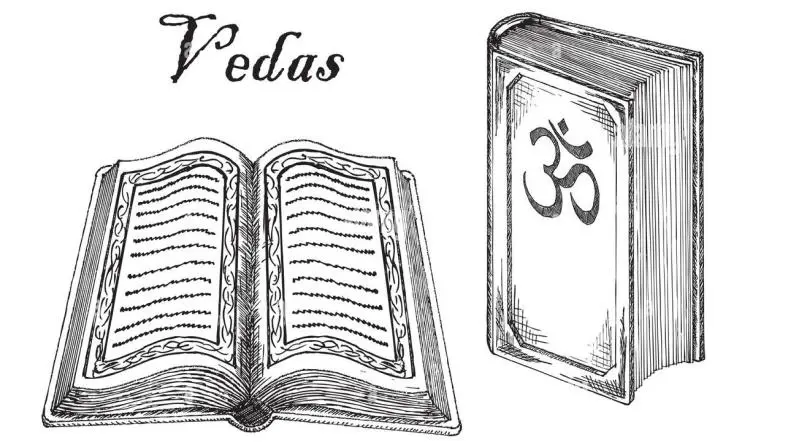The Vedas are the oldest and most important sacred scriptures of Hinduism. They form the foundation of Vedic tradition, Indian philosophy, and many spiritual practices that continue even today. Written in ancient Sanskrit and preserved for thousands of years, the Vedas offer deep insights into spirituality, rituals, life, and the universe.
This article explains the origins, structure, meaning and cultural impact of the Vedas in a simple and easy-to-understand way.
Origins and Historical Background
The Vedas were composed between 1500 BCE and 500 BCE, but their oral tradition is far older. For many centuries, the Vedas were memorized and passed down verbally from one generation to the next. This “shruti” tradition ensured that not a single syllable changed over time.
They emerged during the Vedic period, an important era in ancient India when:
- early spiritual ideas developed
- rituals and ceremonies evolved
- Sanskrit became a structured language
- philosophical thinking began to take shape
Only later were the Vedas written down in text form.
Structure and Classification of the Vedas
There are four main Vedas, each serving a specific purpose in spiritual and ritual life.
1. Rigveda – The Book of Hymns
The Rigveda is the oldest and most important of the four Vedas.
It contains:
- hymns dedicated to gods like Agni, Indra and Varuna
- prayers and praises
- philosophical thoughts on the universe and human life
It is the core text that introduces the earliest ideas of existence, creation and cosmic order.
2. Samaveda – The Veda of Chants
The Samaveda focuses on the musical and melodic aspects of Vedic chanting.
It includes:
- verses that are sung during rituals
- chants used by priests
- instructions on rhythm and musical tones
This Veda highlights the importance of sound and vibration in spiritual practices.
3. Yajurveda – The Veda of Rituals
The Yajurveda is the manual for performing sacrifices and ceremonies.
It contains:
- detailed steps for rituals
- guidelines for offerings
- methods to maintain peace and balance through sacred actions
This Veda ensured that rituals were performed accurately and with discipline.
4. Atharvaveda – The Veda of Practical Life
The Atharvaveda is unique because it deals with everyday life in addition to spiritual knowledge.
It includes:
- prayers for health and protection
- remedies and simple medicines
- spells, charms and practical wisdom
It reflects the daily concerns of ancient people and offers solutions through spirituality.
Philosophical and Ritualistic Teachings in the Vedas
The Vedas contain not just rituals but also deep philosophical ideas.
Some important concepts include:
1. Dharma
The moral duty and right way of living.
It guides both individuals and society.
2. Rta
The idea of cosmic order and truth, which keeps the universe balanced and harmonious.
3. Brahman
The ultimate, infinite reality — the source of all existence.
Many later philosophical schools are based on this concept.
4. Sacrifice and Rituals
The Vedas teach that rituals help maintain balance between:
- humans
- nature
- and divine forces
This harmony was considered essential for a peaceful and prosperous life.
Google Ad 1
Impact of the Vedas on Hinduism and Indian Culture
The influence of the Vedas can be seen in almost every part of Hindu life — from prayers and festivals to philosophy and language.
1. Influence on Religious Practices
Many Hindu rituals performed today are based directly on Vedic traditions, such as:
- chanting mantras
- homas and havans (fire rituals)
- marriage and naming ceremonies
2. Influence on Indian Philosophy
The Vedas inspired major schools of thought, including:
- Vedanta
- Yoga
- Samkhya
The Upanishads, which explore deep spiritual knowledge, are also considered part of the Vedic tradition.
3. Influence on Literature and Language
Sanskrit, the language of the Vedas, shaped:
- classical Indian literature
- grammar
- poetry
- and ancient education systems
Even today, many Indian languages carry the influence of Vedic Sanskrit.
Conclusion
The Vedas stand as a remarkable treasure of ancient wisdom. They are not only the oldest sacred texts of Hinduism, but also a rich source of knowledge about:
- life
- spirituality
- the universe
- ethics
- and human values
Their teachings continue to guide millions of people and remain a strong pillar of Indian culture and tradition.
The Vedas remind us of India’s timeless heritage and its deep spiritual roots, offering wisdom that remains relevant even in the modern world.
Thanks for reading the article! For more History, Culture and Spirituality articles, explore other posts on PeoplesBLOG.















